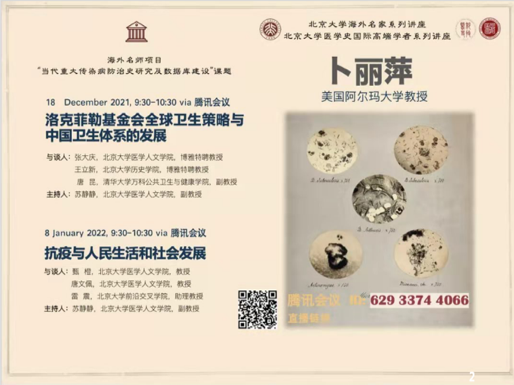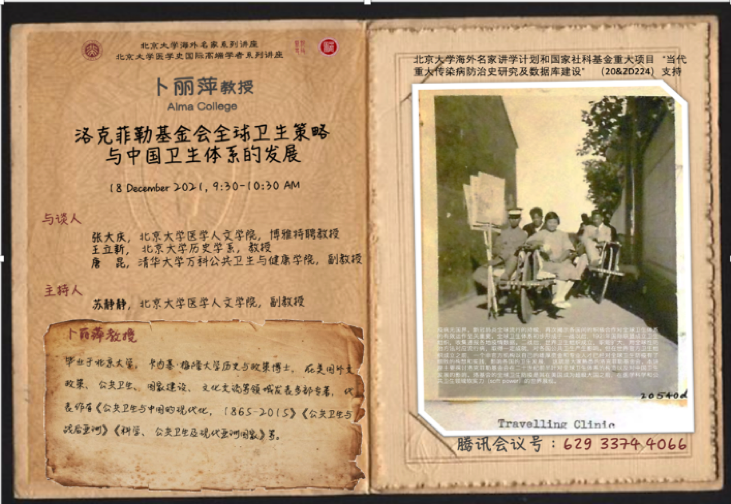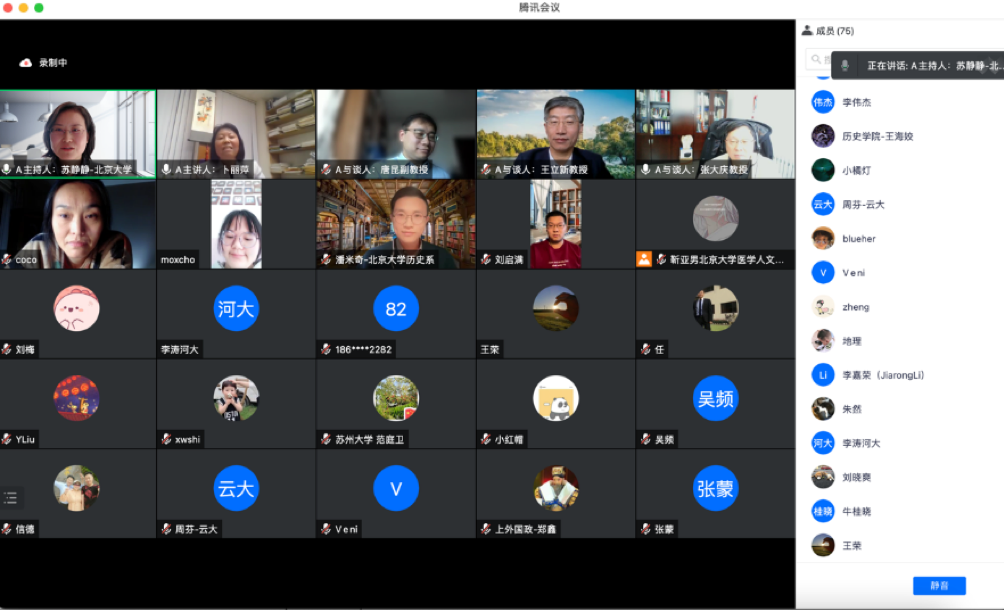Peking University Distinguished Lectureship & Global Health History Lectures: Prof. Bu Liping Ⅰ: Rockefeller foundation's global health strategy and the development of China's health system.
With the support of Peking University Distinguished Lectureship (北京大学海外名家讲学计划) and Chinese National Social Science Foundation Major Project of the “Contemporary Historiography and Database Construction of Epidemics” (PI: Prof Zhang Daqing ),Professor Bu Liping was invited to give two online lectures around frontier issues of global health history in December 2021and January 2022. Bu Liping, the dean of history department of Alma University, US.
The series of Global Health History Lectures were chaired by Prof Su Jingjing, associate professor of the School of Health Humanities of Peking University, and organized under the titles of “The Rockefeller Foundation's global health strategy and the development of China's health system” (18 December 2021) and “Anti-epidemic and people's lives and social development”(8 January 2022).

On the morning of December 18, 2021, Professor Bu Liping delivered her first online lecture, “Rockefeller Foundation's Global Health Strategy and the Development of China's health System”, focusing on the Rockefeller Foundation's influence on the structure of the global health system and China's health development in the first half of the 20th century. The lecture was chaired by Su Jingjing, associate professor of history of medicine, Peking University School of Health Humanities. Three experts were invited to participate in a dialogue with Prof. Bu, they are Zhang Daqing, Peking University Boya Chair Professor with School of Health Humanities, Wang Lixin, Peking University Boya Chair Professor with the Department of History, and Tang Kun, associate professor with Tsinghua University Vanke School of Public Health.


The lecture mainly includes three parts: “international health organization”, “Rockefeller Foundation's global strategy and influence” and “China's activities and influence on the formation of health system”.
Professor Bu Liping introduced the international health organization. In the first half of the 20th century, there were three major international health organizations: two intragovernmental organizations -- LNHO and WHO, and one non-governmental organization -- the Rockefeller Foundation (RF). It is believed that before the establishment of the official health organization, the RF had already carried out the global health conception and epidemic prevention work in the field of global health, especially epidemic prevention public health. The development of bacteriology, immunology and hygiene made it possible to treat and prevent infectious diseases instead of being a terrible and incurable disease. The RF takes the dissemination of modern scientific knowledge and the promotion of social change as its mission, disseminating modern medical science knowledge in countries around the world and reforming traditional social culture. Professor Bu Liping believes that the exchange of knowledge and culture is not one-way and passive. Each country uses new medical knowledge to serve its own social changes and needs.
In the “RF's global strategy and influence” section, Professor Bu believed that the RF 's global strategy and influence can be divided into three aspects, including “global distribution”, “activities in Asian countries” and “China's activities and influence on the formation of health system”.
The RF had a profound impact in different countries following a basically similar approach, through field investigation, projects, health schools and training health cadres, and funding sanitary stations. In practice, the Rockefeller Foundation focused on epidemic prevention and public health in most countries instead of elite-based medical education.
Professor Bu comprehensively explained RF’s activities in China and their impact on the formation of the health system.
Rockefeller Foundation’s activities in China were peculiar. Firstly, the first establishment of RF in China is not a health experimental station, but a world-class medical college, namely Peking Union Medical College Hospital (PUMCH), to train Chinese elites in modern medicine (biomedical). At first, the RF had no plan to establish a health experiment station or public health program in China. It was only the urgent need for public health within the PUMCH and the Chinese society that changed the view of the senior leadership of the RF. In 1921, John Black Grant (兰安生)was sent to China to take charge of public health affairs. At that time, Rockefeller Foundation asked John Black Grant to do three things in China: “First, to design a course of epidemic prevention for teaching; Second, establish campus health services for teachers and students, which can be used as a model for promotion in China. Third, and most important, explore the possibilities of public health in China and accelerate the formation of a national public health movement with the characteristics of permanent and social progress”. During the 18 years from 1921 to 1939 when he left China, John Black Grant not only excelled in these three tasks, but his achievements far exceeded the expectations of the RF leadership. Through John Black Grant's outstanding work, the Rockefeller Foundation has achieved amazing results in China, from the establishment of public health departments and training of professionals, the establishment of experimental health stations in both urban and rural areas, the establishment of urban health departments, and the establishment of the National Ministry of Health. John Black Grant can do these, largely due to his work practices, understanding of Chinese culture, respect for Chinese people, trust, often as a consultant.
Secondly, PUMCH aimed to train medical elites: In the 20 years from 1924 to 1943, 321 doctors graduated; In the 25 years 1924-1950, 279 nurses graduated. The vast majority of graduates work in the national government or headed medical schools. Many of John Black Grant’s students or colleagues have become provincial, municipal and district health leaders; The Health department of the Republic of China was also controlled by PUMC Circle, and most of them had training experience in the United States. That is to say, the health department and the national health system of the Republic of China were directly under the influence of the United States.
Third, a department of health prevention was set up in the PUMCH, and the first health office was set up. Chinese medical scientists from the National Institute for Epidemic Prevention (中央防疫所) were hired as leaders of all departments of the health office. Use field teaching methods to penetrate into daily life and train public health professionals, rather than American-style laboratory teaching methods. Systematically collect statistics on diseases, births and deaths, provide medical services and disseminate health knowledge.
Fourth, the mass education campaign and rural construction movement initiated by Tao Xingzhi(陶行知) and Yan Yangchu(晏阳初)inspired John Black Grant greatly, he has worked with the Chinese government to establish experimental public health zones in both urban and rural areas, everywhere for public health services research, field data collection health situation in China, the practice of copying Beijing First Health Office, expand the influence of modern medicine in the Chinese society.
Finally, the three commentators make comments. Professor Zhang Daqing believes that Professor Bu's lecture on the Rockefeller Foundation from the perspective of global history, including some of John Black Grant's pioneering work in China, is of great value to understanding the development of the Rockefeller Foundation in China's health system. Professor Wang Lixin emphasized on the process of the RF 's spread of public health concepts to China, providing insights on the nature and causes of the Rockefeller Foundation's spread of knowledge across countries. From the perspective of public health, Professor Tang Kun suggest that the activities and localization of the Rockefeller Foundation in China are very worthy of research.
Professor Bu Liping responded to the questions of the guests and students. Active interaction between teachers and students. The lecture came to a successful conclusion.
Mo Xiaocong,
Edited by Su Jingjing; School of Health Humanities


